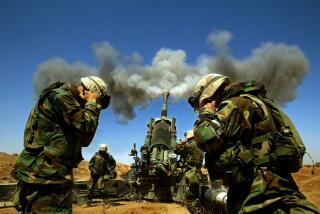Bush’s Distortions Misled Congress in Its War Vote
A year ago, the United States went to war in Iraq because President Bush and his administration convinced Congress and the country that Saddam Hussein was an urgent threat that required immediate military action. The nation has paid a high price for that decision ever since.
The case for war was based on two key claims: that Hussein was on the verge of acquiring nuclear weapons, and that he had close ties to the Al Qaeda terrorists responsible for the atrocities of Sept. 11. Both claims proved to be demonstrably false.
We can only speculate about the real reasons we went to war. What is known, however, is that, at the time the decision was being made in the summer of 2002, Osama bin Laden was still at large, the war against Al Qaeda in Afghanistan had entered a troubled phase, our economy was reeling from recession, the president’s approval rating in the Gallup Poll had declined from its peak of 90% after Sept. 11 to 63% by Labor Day 2002, and control of the Senate and House was at stake in the critical congressional elections in November that year.
Karl Rove, the president’s political advisor, made it clear early on that the war on terrorism could be used politically. At a Republican National Committee meeting on Jan. 19, 2002, he said, “We can go to the country on this issue, because they trust the Republican Party to do a better job of protecting and strengthening America’s military might and thereby protecting America.”
The decision on Iraq was made in August, but the administration announced it in September. As White House Chief of Staff Andrew H. Card Jr. explained on Sept. 7, “from a marketing point of view, you don’t introduce new products in August.”
For maximum political impact, the administration insisted that Congress vote to authorize the war before adjourning that year for the November elections.
The president, as principal cheerleader for war, said on Sept. 25, 2002, “You can’t distinguish between Al Qaeda and Saddam when you talk about the war on terror.” On Oct. 2, he said the issue “is a threat of unique urgency.” On Oct. 7, he said, “facing clear evidence of peril, we cannot wait for the final proof -- the smoking gun -- that could come in the form of a mushroom cloud.” On Oct. 10, the House approved the war resolution 296 to 133; the Senate approved it 77 to 23 the next day.
Republicans voted overwhelmingly to authorize the war; the Democrats were deeply divided. A mushroom cloud. A threat of unique urgency. No distinction between Hussein and Al Qaeda. These were the administration’s reasons, and none of them was true. The GOP prevailed in the 2002 elections and regained control of Congress, but it was a hollow victory.
Presumably, the administration felt it could not persuade Congress to authorize the war on the basis of chemical and biological weapons alone, since Hussein’s arsenal had been successfully contained for years. The case for war depended on hyping the nuclear threat and ties to Al Qaeda. In fact, the intelligence community had poured cold water on both the nuclear threat and the Al Qaeda link before the war began. CIA Director George J. Tenet stated in a speech last month that the agency told the administration before the war that “Saddam did not have a nuclear weapon, and probably would have been unable to make one until 2007 to 2009.”
The ties to Al Qaeda were just as dubious. Before the war, the intelligence community found no cooperative relationship between Hussein and Al Qaeda. It had low confidence even in the prospect that, in desperation, Hussein might share chemical and biological weapons with Al Qaeda. In February 2003, FBI investigators said they had been baffled by the administration’s insistence on a solid link. “We just don’t think it’s there,” said one official.
The truth was there to see, but the administration refused to see it. America went to war in a dishonest way that alienated key allies, divided and weakened the United Nations, outraged the world community, made us more hated in the world and made the war on terrorism more difficult to win.
The decision on war or peace is the most important decision any president ever makes. The prime minister of Spain paid a high price Sunday for supporting us in the war, and for misleading the Spanish people. President Bush is likely to pay a similar high price in November.
Edward M. Kennedy, a Democrat, is the senior senator from Massachusetts.
More to Read
Get the L.A. Times Politics newsletter
Deeply reported insights into legislation, politics and policy from Sacramento, Washington and beyond. In your inbox three times per week.
You may occasionally receive promotional content from the Los Angeles Times.










